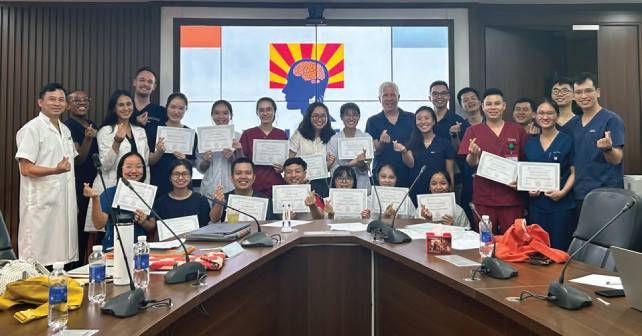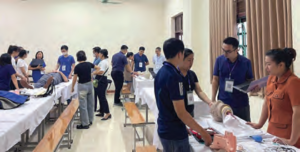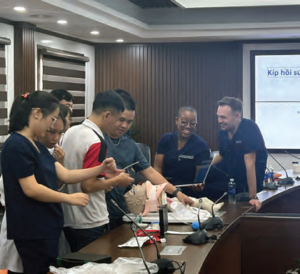
In the bustling streets of Vietnam, motorcycles remain the predominant mode of transportation. Navigating through Hanoi’s vibrant traffic, unhelmeted riders and close call accidents are all too common. Despite the implementation of a mandatory helmet law in 2007, road traffic collisions continue to be a significant contributor to traumatic brain injuries (TBI) and are the leading cause of both fatal and nonfatal injuries.1,2 To address this issue, a team of global health professionals endeavored to enhance the management of TBI patients in Vietnam. Their initiative not only aimed to elevate the standard of care for the emergent management of TBI in Vietnam, but also served as a model of excellence for global health interventions worldwide.
Explore This Issue
ACEP Now: Vol 43 – No 07 – July 2024Central to this initiative is a comprehensive training protocol, the EPIC (Excellence in Prehospital Injury Care) Traumatic Brain Injury Project, which has demonstrated a significant improvement in TBI outcomes.3 In the United States, the EPIC protocol has effectively promoted evidence-based standards for TBI treatment, emphasizing stabilization for optimized neurological outcomes. The EPIC-TBI training protocol, historically used to train EMS crews, proved to be simple, effective, and adaptable for low-resource settings, making it suitable for international use.

Physicians from the UT Health Houston Department of Emergency Medicine and Hanoi Medical University collaborated to introduce an EPIC-TBI training course.
Physicians from the UT Health Houston Department of Emergency Medicine and Hanoi Medical University collaborated to introduce an EPIC-TBI training course tailored for health care workers in the Hanoi region, including nurses, emergency medicine physicians, and trauma surgeons. Through a blend of didactic sessions, hands-on workshops, and simulated and case-based scenarios, participants were equipped to recognize TBI, assess its severity, and initiate timely interventions. To ensure sustainability and broad impact, the UT Health Houston team employed a train-the-trainer model, imparting specialized knowledge and skills to a select group of emergency medicine physicians who then acted as trainers for their peers. Local experts contributed to curriculum adaptation, aligning the training with Vietnam’s unique health care landscape and promoting ownership and cultural relevance. Thanks to the China Medical Board (CMB) Foundation, the team secured a global health equity grant for a one-year pilot project for the EPIC-TBI training program.
But was there an impact?
“The project was very important; it changed the way we treat those with traumatic brain injury. The train-the-trainer model was effective because the young instructors were able to learn and subsequently support other instructors,” says Dr. Hai, a leading EM physician in Hanoi.
The team successfully achieved its primary objective of sharing a TBI evidence-based resuscitation protocol developed in the United States and adapting it for use in Vietnam. This effort exemplified the transfer of knowledge between a high-income country (HIC) and a low-middle-income country (LMIC) in a flexible, collaborative, and resource-sensitive manner. The health care professionals in Vietnam displayed remarkable resilience and adaptability. Witnessing their commitment to delivering quality care, even under challenging circumstances, was both humbling and inspiring. In a show of pragmatic solidarity between countries, the teams utilized the train-the-trainer and lecture presentation models in the audience’s native language,
facilitated by collaboration with native experts, rather than delivering content in a foreign language and relying on real-time interpreters. Moreover, working relationships between the UT Health Houston McGovern Medical School, Department of Emergency Medicine, and Hanoi Medical University, lay the foundation for future collaborative efforts.
The ultimate success of this international endeavor—defined as the integration of the adapted EPIC-TBI algorithm into best practice guidelines within Vietnam’s trauma systems—hinges on the ability of an international, multicultural team to champion the initiative and to expand training and adaptation at institutional, local, and national levels. While significant undertakings like establishing a high-quality EMS system, a trauma
system, and a shared electronic medical record system will impact the speed and efficiency of this integration in Vietnam, the Houston-based team believes they have created a replicable model for international medical information exchange. The next step is to evaluate the effectiveness of Vietnam’s modified EPIC-TBI protocol and training through a pilot project, once again collaborating as an international team of investigators, educators, and clinicians.
 Dr. Bobrow is a professor of emergency medicine at McGovern Medical School at UTHealth Houston and Co-PI of the EPIC-TBI Trial.
Dr. Bobrow is a professor of emergency medicine at McGovern Medical School at UTHealth Houston and Co-PI of the EPIC-TBI Trial.
 Dr. Walia is an assistant professor and global health director of emergency medicine at McGovern Medical School at UTHealth Houston.
Dr. Walia is an assistant professor and global health director of emergency medicine at McGovern Medical School at UTHealth Houston.
 Dr. Tran is an assistant professor of emergency medicine and management, policy, and community health at UTHealth Houston, specializing in clinical population health and advocacy.
Dr. Tran is an assistant professor of emergency medicine and management, policy, and community health at UTHealth Houston, specializing in clinical population health and advocacy.
 Dr. Hoang is an associate professor of emergency and critical care medicine at Hanoi Medical University, Hanoi, Vietnam.
Dr. Hoang is an associate professor of emergency and critical care medicine at Hanoi Medical University, Hanoi, Vietnam.
References
- Contents (by MWL Topic Area). National Transportation Safety Board; 2020. Accessed April 4, 2024. https://www.ntsb.gov/Advocacy/mwl/Documents/2019-20/2019-20-MWL-SafetyRecs.pdf
- World Health Organization (WHO). Global status report on road safety 2018: Summary. https://apps.who.int/iris/bitstream/handle/10665/277370/WHONMHNVI-18.20-eng.pdf. December 24, 2018. Accessed June 17, 2024.
- Spaite DW, Bobrow BJ, Keim SM, et al. Association of statewide implementation of the prehospital traumatic brain injury treatment guidelines with patient survival following traumatic brain injury: the Excellence in Prehospital Injury Care (EPIC) Study. JAMA Surg. 2019;154(7):e191152.
Pages: 1 2 3 | Multi-Page







No Responses to “A Train-the-Trainer Model Implements Traumatic Brain Injury Protocol in Vietnam”